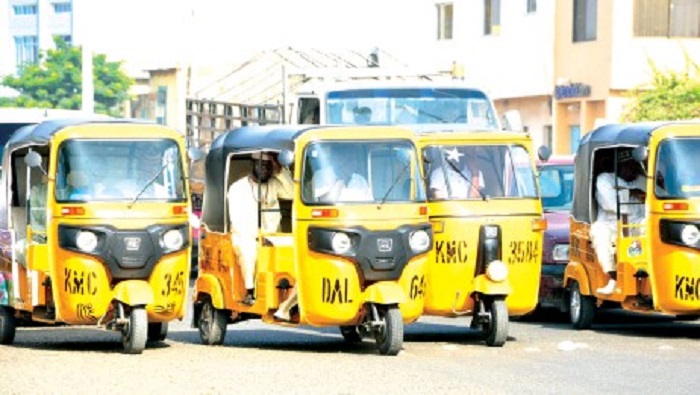Kano tricycle riders to pay N100,000 for new permit
The Kano State Roads and Traffic Agency (KAROTA) has said that tricycle riders who need to acquire a new driving permit in the state must pay the sum of N100,000 before acquiring an operation licence. The review of the dues up from the initial N8,000 is as the result of the expiration of the ultimatum […]

FILE PHOTO: Tricycles
The Kano State Roads and Traffic Agency (KAROTA) has said that tricycle riders who need to acquire a new driving permit in the state must pay the sum of N100,000 before acquiring an operation licence.
The review of the dues up from the initial N8,000 is as the result of the expiration of the ultimatum given to the riders earlier, according to the agency.
The managing director of the agency, Baffa Babba Dan-Agundi, stated this on Wednesday during a press briefing in Kano.
The MD said: “For anybody who refuses to register before, now he has to pay N100,000.
“Before, the permit was N8,000, now it is going to be N100,000 because you can see the inflow of new people coming to Kano State.
“We have to take the measures to tackle this. You didn’t register at the time we gave the chance, now you are going to pay N100,000 to get a permit to operate,” Dan-Agundi added.
He explained that the enforcement of the new directive will start immediately and those apprehended will be charged to court.
Dan-Agundi said there were now 60,000 registered tricycles operating in the state, and that collection of the permit fees will be run by Kano State Internal Revenue Service (KIRS) while KAROTA would only enforce the policy.
On the issue of the N100 daily tax, the MD said its collection is also the responsibility of KIRS and that riders could pay via Point of Sale (POS) machines provided in virtually all parts of the Kano metropolis.
Daily Trust reports that tricycle riders in the state had in February embarked on a three-day warning strike to resist the enforcement of the daily N100 tax and compulsory use of trackers on their tricycles among others.
They later resolved and agreed to be paying the N100 levy via POS machines, without necessarily going to banks or internet cafes to pay.
